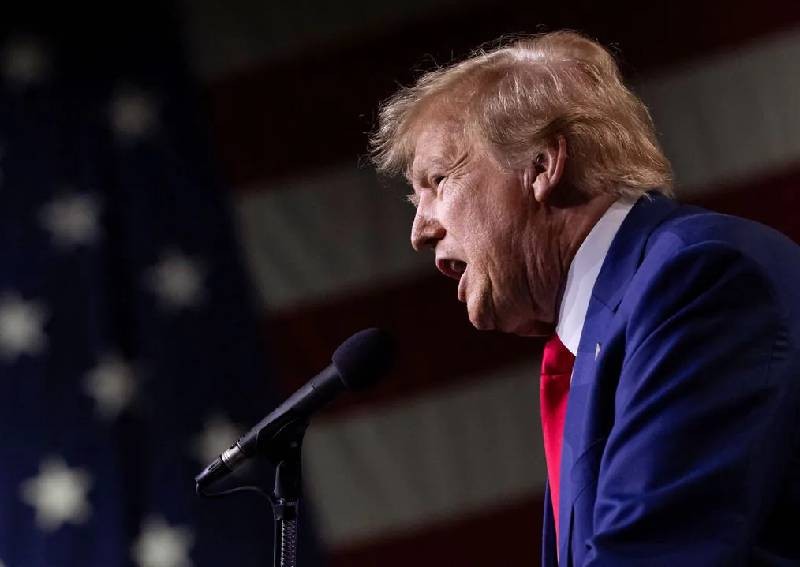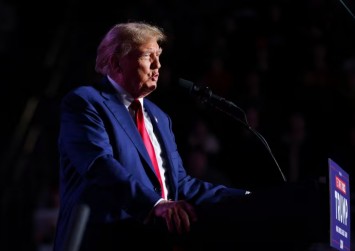
Robert Reich: What About Trump’s Dementia? – OpEd
By Robert Reich
On Saturday, during a campaign speech in Durham, New Hampshire, Donald Trump invoked Vladimir Putin (of all people) as proof that he’s being persecuted:
“Putin says that Biden’s — and this is a quote — politically motivated persecution of his political rival is very good for Russia, because it shows the rottenness of the American political system, which cannot pretend to teach others about democracy.”
Some commentators see this and other Trump assertions about being persecuted as calculated efforts to fuel his base.
But what if Trump really thinks he’s being persecuted? What if he has a persecution complex? What if he believes his paranoid fantasies?
Trump is not facing nearly the same scrutiny for his age as is Joe Biden, yet Trump should be — especially as to increasing signs of dementia.
Biden is sane. He’s getting major bills passed. He’s negotiating with world leaders.
But Trump — who has a family history of dementia — is increasingly incoherent and unhinged.
He has confused Biden with Obama so often that he’s had to put out a statement that the slips have been intentional.
In September, Trump suggested that the way to prevent wildfires in California’s forest lands is to keep them damp. Here are his exact words:
“They say that there’s so much water up north that I want to have the overflow areas go into your forests and dampen your forests, because if you dampen your forests you’re not gonna have these forest fires that are burning at levels that nobody’s ever seen.”
Hello?
He also said that under his administration, shoplifters would be subject to extrajudicial execution.
“We will immediately stop all the pillaging and theft. Very simply, if you rob a store, you can fully expect to be shot as you are leaving that store.”
In October, Trump warned his supporters that Biden will lead America into World War Two.
He has also claimed that Hezbollah, the Iranian-backed militant group, is “very smart.” That whales are being killed by windmills. That he won all 50 states in 2020. That he defeated Barack Obama in 2016. That the outgoing chair of the Joint Chiefs of Staff should be executed. That MSNBC’s parent company is guilty of treason, and will “pay.” And that he will only be a dictator on “Day 1”of a new term.
The most telling evidence of Trump’s growing dementia is found in his paranoid thirst for revenge, on which he is now centering his entire campaign.
On November 11, he pledged to a crowd of supporters in Claremont, New Hampshire, that:
“We will root out the communists, Marxists, fascists and the radical left thugs that live like vermin within the confines of our country, that lie and steal and cheat on elections and will do anything possible — they’ll do anything, whether legally or illegally, to destroy America and to destroy the American dream.”
Are these the words of a sane person? Or of an aging paranoid megalomaniac? Even if it’s unclear to which category Trump belongs, shouldn’t this question be central to the coverage of his campaign for reelection?
When I’ve asked members of the media why they’re not covering the increasing signs of Trump’s dementia, they say it’s “old news.”
After all, back in 2017, 27 psychiatrists, psychologists, and other mental health professionals concluded in The Dangerous Case of Donald Trump that Trump’s mental health posed a “clear and present danger” to the nation.
Members of Trump’s own Cabinet — horrified by the January 6, 2021, violence at the Capitol and Trump’s lack of urgency in stopping it — discussed whether to invoke the the 25th Amendment to remove him from office due to mental incompetence.
But just because Trump has shown mental instability in the past doesn’t make his mental problems any less relevant now that he is seeking reelection. They’re more relevant. He appears even more delusional and unhinged than before.
If Biden’s age is fair game, why aren’t Trump’s age and apparent mental decline?
Biden may appear frail at times, but he’s rational. The growing evidence of Trump’s dementia and paranoia, on the other hand, poses a potential danger to the future of America — if he’s reelected. At the least, the media should be investigating and reporting on it.
Former US President Donald Trump. Photo Credit: Tasnim News Agency
This article was published at Robert Reich’s Substack

Robert B. Reich is Chancellor's Professor of Public Policy at the University of California at Berkeley and Senior Fellow at the Blum Center for Developing Economies, and writes at robertreich.substack.com. Reich served as Secretary of Labor in the Clinton administration, for which Time Magazine named him one of the ten most effective cabinet secretaries of the twentieth century. He has written fifteen books, including the best sellers "Aftershock", "The Work of Nations," and"Beyond Outrage," and, his most recent, "The Common Good," which is available in bookstores now. He is also a founding editor of the American Prospect magazine, chairman of Common Cause, a member of the American Academy of Arts and Sciences, and co-creator of the award-winning documentary, "Inequality For All." He's co-creator of the Netflix original documentary "Saving Capitalism," which is streaming now.
Trump would install loyalists to reshape US foreign policy on China, Nato and Ukraine

Republican presidential candidate and former U.S. President Donald Trump speaks during a rally in Reno, Nevada, US Dec 17, 2023.
PHOTO: Reuters
PUBLISHED ON DECEMBER 18, 2023
WASHINGTON — Donald Trump in a second term would likely install loyalists in key positions in the Pentagon, State Department and CIA whose primary allegiance would be to him, allowing him more freedom than in his first presidency to enact isolationist policies and whims, nearly 20 current and former aides and diplomats said.
The result would enable Trump to make sweeping changes to the US stance on issues ranging from the Ukraine war to trade with China, as well as to the federal institutions that implement — and sometimes constrain — foreign policy, the aides and diplomats said.
During his 2017 to 2021 term, Trump struggled to impose his sometimes impulsive and erratic vision on the US national security establishment.
He often voiced frustration at top officials who slow-walked, shelved, or talked him out of some of his schemes. Former Defence Secretary Mark Esper said in his memoir that he twice raised objections to Trump's suggestion of missile strikes on drug cartels in Mexico, the US's biggest trade partner. The former president has not commented.
"President Trump came to realise that personnel is policy," said Robert O'Brien, Trump's fourth and final national security adviser. "At the outset of his administration, there were a lot of people that were interested in implementing their own policies, not the president's policies."
Having more loyalists in place would allow Trump to advance his foreign policy priorities faster and more efficiently than he was able to when previously in office, the current and former aides said.
Among his proposals on the campaign trail this year, Trump has said he would deploy US Special Forces against the Mexican cartels — something unlikely to get the blessing of the Mexican government.
If he returns to power again, Trump would waste little time cutting defence aid to Europe and further shrinking economic ties with China, the aides said.
O'Brien, who remains one of Trump's top foreign policy advisers and speaks to him regularly, said imposing trade tariffs on Nato countries if they did not meet their commitments to spend at least two per cent of their gross domestic product on defence would likely be among the policies on the table during a second Trump term.
The Trump campaign declined to comment for this article.
Unlike in the lead-up to his 2016 election, Trump has cultivated a stable of people with whom he speaks regularly, and who have significant foreign policy experience and his personal trust, according to four people who converse with him.
Those advisers include John Ratcliffe, Trump's last Director of National Intelligence, former US Ambassador to Germany Richard Grenell, and Kash Patel, a former Trump staffer who held several positions in the intelligence and defence communities.
None of those people responded to interview requests.
While the specific policies of these informal advisers vary to some degree, most have been vocal defenders of Trump since he left office and have expressed concerns that America is paying too much to support both Nato and Ukraine.
"Doomsday option"
Trump has a commanding lead in the Republican presidential nomination race. If he becomes the Republican nominee and then defeats Democratic President Joe Biden next November, the world will likely see a much more emboldened Trump, more knowledgeable about how to wield power, both at home and abroad, the current and former aides said.
That prospect has foreign capitals scrambling for information on how a second Trump term would look. Trump himself has offered few clues about what kind of foreign policy he would pursue next time around, beyond broad claims like ending the Ukraine war in 24 hours.
Eight European diplomats interviewed by Reuters said there were doubts about whether Trump would honour Washington's commitment to defend Nato allies and acute fears he would cut off aid to Ukraine amid its war with Russia.
One Northern European diplomat in Washington, who spoke on condition of anonymity because of the sensitivity of the issue, said he and his colleagues had kept talking to Trump aides even after the former president left the White House in 2021.
"The story from there was, 'We were not prepared (to govern), and next time it has to be different,'" the diplomat said. "When they got into the Oval Office in 2017, they didn't have any idea what the hell to do with it. But this won't happen again."
The diplomat, whose country is a Nato member, and one other diplomat in Washington said their missions have outlined in diplomatic cables to their home capitals a possible "doomsday option."
In that hypothetical scenario, one of multiple post-election hypotheses these diplomats say they have described in cables, Trump makes good on pledges to dismantle elements of the bureaucracy and pursue political enemies to such a degree that America's system of checks and balances is weakened.
"You have to explain to your capital. 'Things might go rather well: the US keeps on rehabilitating herself' (if Biden is re-elected)," said the diplomat, describing his mission's view of American politics. "Then you have Trump, a mild version: a repetition of his first term with some aggressive overtones. And then you have the doomsday option."
Retreat from globalism
Michael Mulroy, the Deputy Assistant Secretary of Defence for the Middle East under Trump, said the former president would likely appoint individuals who subscribed to his isolationist brand of foreign policy and were unlikely to confront him.
All US presidents have the power to name political appointees to the most senior jobs in the federal bureaucracy, including the State Department, Pentagon and the CIA.
"I think it will be based primarily on loyalty to President Trump," Mulroy said, "a firm belief in the kind of foreign policy that he believes in, which is much more focused on the United States, much less on a kind of globalist (policy)."
Trump clashed with his own appointees at the Pentagon on a number of issues in his first term, from a ban on transgender service members that he supported to his 2018 decision to pull US troops from Syria.
When his first defence secretary, Jim Mattis, resigned in 2018, the former four-star general stated he had significant policy differences with Trump. While Mattis did not explicitly lay them out, he stressed in his resignation letter the need to maintain an ironclad bond with Nato and other allies, while keeping enemies, like Russia, at arms-length.
Ed McMullen, Trump's former ambassador to Switzerland and now a campaign fund-raiser who is in contact with the former president, stressed that most foreign service personnel he knew served the president faithfully.
But, he said, Trump was aware of the need to avoid choosing disloyal or disobedient officials for top foreign policy posts in a second term.
"The president is very conscious that competency and loyalty are critical to the success of the (next) administration," he said.
Outside of Trump's top circle of advisers, a potential Trump administration plans to root out actors at lower levels of the national security community perceived to be "rogue," according to Agenda47, his campaign's official policy site.
Such a step would have little precedent in the United States, which has a non-partisan bureaucracy that serves whichever administration is in office.
Trump has said he plans to reinstate an executive order he issued in the final months of his first term, which was never fully implemented, that would allow him to more easily dismiss civil servants.
In a little-reported document published on Agenda47 earlier this year, Trump said he would establish a Truth and Reconciliation Commission, which would, among other functions, publish documents related to Deep State abuses of power. He would also create a separate "auditing" body meant to monitor intelligence gathering in real time.
"The State Department, Pentagon, and National Security Establishment will be a very different place by the end of my administration," Trump said in a policy video earlier this year.
Nato pullout? New trade war
During a second term, Trump has pledged to end China's most favoured trading nation status — a standing that generally lowers trade barriers between countries — and to push Europeans to increase their defence spending.

Trump repeats 'poisoning the blood' anti-immigrant remark
Whether Trump will continue vital US support for Ukraine in its war with Russia is of particular importance to European diplomats in Washington trying to prepare, as is his continued commitment to Nato.
"There are rumours that he wants to take the US away from Nato or withdraw from Europe, of course it sounds worrying but ... we are not in a panic," said a diplomat from one Baltic state.
Despite worries about the future of Nato, several diplomats interviewed for this article said pressure from Trump during his first term did lead to increased defence spending.
John Bolton, Trump's third national security adviser who has since become a vocal critic of the former president, told Reuters he believed Trump would withdraw from Nato.
Such a decision would be earth-shaking for European nations that have depended on the alliance's collective security guarantee for nearly 75 years.
Three other former Trump administration officials, two of whom are still in contact with him, played down that possibility, with one saying it would likely not be worth the domestic political blowback.
At least one diplomat in Washington, Finnish Ambassador Mikko Hautala, has spoken to Trump directly more than once, according to two people with knowledge of the interactions, which were first reported by The New York Times.
Those discussions centred on the Nato accession process for Finland. Hautala wanted to make sure Trump had accurate information about what Finland brings to the alliance and how Finland joining benefits the US, one of the people said.
Source: Reuters
No comments:
Post a Comment